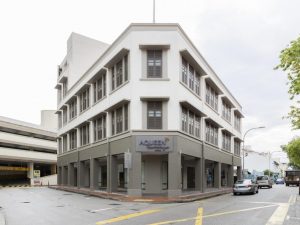70-room boutique hotel in Joo Chiat for sale by Expression of Interest

Aqueen Heritage Hotel – Joo Chiat, a boutique hotel located at 51 Joo Chiat Road, has been put up for sale via an Expression of Interest (“EOI”) exercise by the exclusive marketing agent, Cushman & Wakefield.
Located in the Joo Chiat Conservation Area, the hotel is zoned “Commercial” with a gross plot ratio of 3.0 according to the Master Plan 2019. It sits on a corner plot with a land area of 7,629 sq ft and has a gross floor area of 22,925 sq ft, comprising 70 rooms with sizes ranging from 140 sq ft to 276 sq ft and a shop space of 1,744 sq ft. Currently operated under Aqueen Hotels & Resorts, the brand offers business and leisure travelers value-for-money accommodation options in convenient locations.
The Joo Chiat boutique hotel is within a short walk to both Paya Lebar and Eunos MRT stations. It is also located in proximity to the cultural neighborhood of Geylang Serai and Joo Chiat, where visitors can soak in the rich heritage of the area, as well as indulge in the great variety of local cuisines.
The location of Joo Chiat boutique hotel caters to both leisure and business travelers alike, notably from the Paya Lebar precinct. Amenities are aplenty nearby, with a plethora of both old and new shopping malls just a stone’s throw away.
Table of Contents
Mr. Shaun Poh, Executive Director of Capital Markets at Cushman & Wakefield, said, “This is a rare opportunity to acquire a hospitality asset with a palatable quantum. Having opened its doors in 2016, the hotel is in pristine condition and uniquely designed with Peranakan elements. Buyers can capitalise on the opportunity to benefit from the ongoing rejuvenation of the Paya Lebar precinct. They may also be well-positioned to capture the recovery in leisure and business travel in light of positive development in the COVID-19 vaccination scene, which will enable Singapore to re-open and expedite recovery from the pandemic.”
The indicative price for Joo Chiat boutique hotel is $55 million. The EOI exercise for the Joo Chiat boutique hotel closes on 24 February 2021, at 3.00pm.
Joo Chiat Road is an arterial road and a residential conservation area in the eastern part of Singapore, and is located between Geylang Serai and Marine Parade Road. In 2011, the vicinity surrounding Joo Chiat Road was declared Singapore’s first Heritage Town. It is chosen, in part, because of strong efforts to promote its Peranakan culture.
In 1993, the area around Joo Chiat Road was gazetted as a conservation district. As a result, shophouses and bungalows reflecting the typical architectural styles of the turn of the twentieth century have been preserved, as well as many unique and straits eclectic style Chinese shophouses which give the area its true flavour. The area is also known for eateries specialising in Peranakan delicacies.
There are famous eateries which contribute to Joo Chiat’s popularity as a dining spot. There are various Vietnamese, Chinese and western restaurants, a multicultural food enclave, not just a Peranakan enclave. The restaurants and various eateries along the street are of varied cuisines but perhaps one particular cuisine stood out – Vietnamese. Joo Chiat has been known for being a “Little Vietnam”. There is cluster of Vietnamese restaurants, as well as Vietnamese grocery store, which were opened to serve the Vietnamese community in Singapore.
As the Kampongs in Geylang made way for HDBs, a museum to showcase the life of Malays was proposed in the 70s. This museum, Geylang Serai Malay Village, was completed in 1989 and located at the start of Joo Chiat Road. The period also saw many more buildings for retail purposes such as Galaxy Complex, Katong Mall, Roxy Square and Paramount Shopping Centre. During the late 90s and early 2000s, more schools and churches were built at the outskirts of Joo Chiat area, presumably for the larger community there.
Mr Paul Ho, chief mortgage officer at iCompareLoan, said: “The global economic outlook is expected to remain subdued in the near term given the ongoing uncertainty and risks of new waves of COVID-19.”
He added: “I am confident that the hospitality industry will rebound sharply after the vaccine becomes widely available by the end of 2021. Combined with TraceTogether, it could allow for some optimism and the return to at least a 70% travel economy starting mid-2021. When international travel without quarantine returns with the World Economic Forum which will convene the Special Annual Meeting 2021 in Singapore from 25-28 May, the industry’s legacy of resilience and agility will be seen.”
Mr Ho suggested, “Since this is the downtime for most hoteliers, they should take this opportunity to review their business strategies and position themselves for the eventual upturn.”
He added, “What they should do is, develop a pricing strategy to make their hotel more attractive once demands returns. Pricing room rates competitively is important as rooms priced lower would mean a slower hotel recovery for the real estate owners and investors.”
In an earlier report, Colliers said that as markets start to recover, consumers will prioritise health, safety and hygiene when it comes to travel planning and decision making. Personal space will also be more important; instead of large tour groups, independent travel will take precedence and people will likely prefer bespoke holidays and seek out travel experiences with a purpose (such as health and wellness, eco-travel, etc.).
Technology will also take on a more critical role in the traveler ecosystem and be a key tool in the revival of travel. Robots, chatbots, automation, recognition technology, artificial intelligence (AI), internet of things (IoT) and virtual reality (VR) will become increasingly commonplace.






